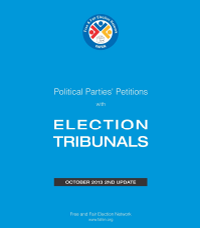ISLAMABAD, November 5, 2013: The tribunals set up to resolve election complaints had disposed of 65 of the 339 cases heard until September 30, 2013. However save for one, all of these cases were disposed of on technical grounds, said a press release issued by the Free and Fair Election Network (FAFEN) on Tuesday.
The current speed at which tribunals are deciding petitions will likely delay the results of many petitions beyond the legal stipulated time of 120 days. The legal time for tribunal starts when ECP refers a petition to it.
The election results were officially notified on May 22 and the candidates had until July 6 to submit petitions with the ECP. The Election Commission of Pakistan (ECP) had constituted 14 tribunals (13 working) across the country to redress election related complaints of contesting candidates. The commission received 402 petitions in all, according to media reports.
Of the cases whose records are available, 37 challenged the nomination process, 82 challenged the qualification of the winning candidates, 194 made allegations of a corrupt or illegal practice by people other than the returned candidate and 220 directly accused the winning candidate of being involved in a corrupt or illegal practice to sway the results of the poll.
Moreover, 179 petitions sought disqualification of the winning candidate and the petitioner to be declared as the winning candidate instead. Another 73 sought a re-poll in the constituency. The counting of ballot papers for the entire or parts of a constituency were sought in 67 petitions. Thirty-five petitions wanted a re-examination of the votes declared invalid, while 48 petitions sought re-polling at certain polling stations. Thirty-eight petitions sought reliefs other than the five categories identified above.
FAFEN has gathered these statistics by instituting a legal study on election dispute resolution mechanism. A total of 18 trained and non-partisan lawyers are facilitating FAFEN in this study.
The Lahore tribunal has been the most busy, having received 48 petitions in all, followed by Peshawar and Faisalabad. The Karachi tribunal received the least number of petitions, despite media reports pointing to a number of issues in the May 11 general election.
A party-wise analysis of the petitions filed against winning candidates shows that members of the three top parties in the National Assembly filed the bulk of petitions. PML-N members filed 64 petitions, almost evenly distributed across the 13 tribunals. PTI members followed with 51 petitions. Members of PPPP, the second-largest party in the National Assembly, filed 41 of the 339 petitions, almost evenly distributed across the country. JUI-F members filed 27 petitions, mostly in Peshawar (10) and Loralai (09).
Similarly, members of PML-N – the party with the majority seats in the National Assembly (over 50%) – had the lion’s share of petitions filed against them. Over a third (126, or 37.17%) of the 339 petitions were filed against PML-N returned candidates. Most of these petitions were filed in Punjab (over 83%). The highest number of petitions filed against PML-N were in Lahore (42), followed by Faisalabad (26), Multan (16) and Bahawalpur (15). There were no petitions filed against the party in Hyderabad or Sukkur.
PPPP returned candidates were nominated in 45 petitions, mostly in Sindh – 24 petitions in Sukkur and 20 petitions in Hyderabad.
The third-most nominated party was the PTI, with 29 petitions making the party’s winning candidates respondents, mostly in Khyber Pakhtunkhwa (Peshawar 13, Abbottabad 05 and Dera Ismail Khan 03).
JUI-F winners were nominated in 18 petitions (mostly in Loralai, Dera Ismail Khan and Peshawar), followed by PkMAP (12, all in Loralai), PML (08), ANP and MQM (five each), and PML-F (four). Winning candidates belonging to other parties, including regional and/or smaller parties were nominated in 17 petitions.


